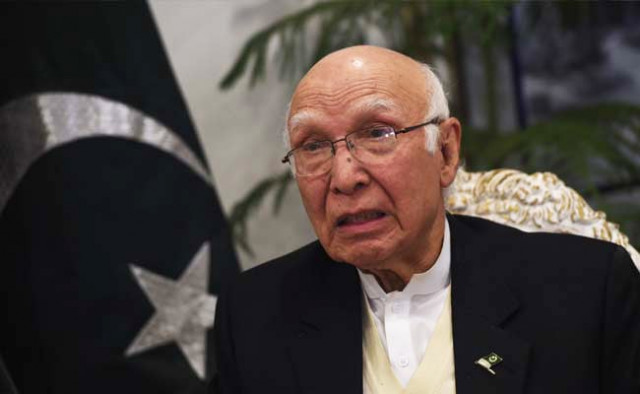Aziz tears into Modi’s water war threat
Says abrogation of Indus Waters Treaty by India will be considered an ‘act of war'

PHOTO: REUTERS
While the verbal duel between the two archrivals is becoming more vociferous, Pakistan on Tuesday approached the World Bank, which was instrumental in brokering the Indus Waters Treaty in 1960, to seek arbitration on pending disputes with India on the construction of Kishanganga and Ratle hydroelectric plants on the rivers Neelum and Chenab, respectively.
India's revocation of Indus Water Treaty will be considered an act of war: Aziz
The Modi administration has decided to fast-track construction of new hydropower plants on three rivers in an attempt to run Pakistan dry as a punitive measure. “Blood and water cannot flow together,” Modi said. But in a seething rejoinder, Pakistani prime minister’s top foreign policy aide warned that any violation of the Indus Waters Treaty by India would be considered an ‘act of war’.
“Pakistan will not accept Indian aggression in any form and any Indian step for disrupting water flow as upper riparian will pertain to considerable risk of war and hostilities,” Sartaj Aziz told lawmakers in the lower house of parliament.
“Neither side can alter or revoke the Indus Waters Treaty unilaterally,” he said citing provisions of the agreement. “The treaty will continue to remain in force until modified by the two countries with mutual understanding.”

Aziz warned that if India tried to interrupt water flowing into Pakistan’s rivers as an upper riparian, then it would not only violate the treaty but also set a regional state practice under which an international law could serve as precedence for others. “Such an Indian act may also provide China with a justification to consider suspension of water in India’s Brahmaputra River.”
Indian prime minister reviews Indus Waters Treaty
Aziz said the treaty had survived the 1965 and 1971 wars, and was not even suspended during the Kargil and Siachin conflicts. “It is cited as the most successful water treaty between the two countries and its revocation can be taken as an act of war or a hostile act against Pakistan,” he added.
The Indus Waters Treaty was negotiated by India and Pakistan under the auspices of the World Bank after New Delhi started interfering with the waters flowing downstream by stopping waters on the rivers Ravi and Sutlej from April 1, 1948.
The treaty gives India the right to use waters of the eastern rivers – Ravi, Sutlaj and Beas – and gives Pakistan control over western rivers – Indus, Jhelum, Chenab– with limited allowance of use of water by India from the western rivers for purposes of, among others, power generation.
The treaty provides specific design criteria for any hydroelectric power plants to be built by India. Pakistan has held the position that the Kishenganga and Ratle hydroelectric plants violate the design parametres of the treaty.
Pakistan formally requested India on 19 August 2016 for settlement of outstanding disputes over construction of Kishanganga and Ratle hydroelectric plants by referring the matters to the Court of Arbitration as provided in Article IX of the treaty.
Under the treaty, the World Bank has an important role in the establishment of the Court of Arbitration by facilitating the process of appointment of three judges, called umpires, to the court, while each country appoints two arbitrators.
On Tuesday, a government delegation, led by Attorney General of Pakistan Ashtar Ausaf Ali, met with senior officials of the World Bank at its headquarters to discuss matters relating to Pakistan’s recent request for arbitration given to India pursuant to Article IX of the Indus Waters Treaty, 1960, according to the AGP office on Tuesday.
The purpose of the meeting with World Bank officials was to insist on early appointment of the judges and empanelment the court, says the AGP office statement. The World Bank committed itself to timely fulfilling its obligations under the treaty while remaining neutral.
Desperate Modi now plots to run Pakistan dry
The Pakistani delegation was made up of AGP Ashtar Ausaf Ali, Water and Power Secretary Muhammad Younus Dagha; Pakistan’s Indus Water Commissioner Mirza Asif Baig and other senior officials. Pakistan’s Ambassador to the US Jalil Abbas Jilani and World Bank Executive Director for Pakistan Nasir Khosa also attended the meeting.
The World Bank was represented by Senior Vice President Anne-Marie LeRoy, Vice President for South Asia Annette Dixon, Deputy General Counsel for Operations Alberto Ninio; Chief Counsel for South Asia Melinda Good, and Senior Counsel for International Waterways Victor Mosoti.
Published in The Express Tribune, September 28th, 2016.


















COMMENTS
Comments are moderated and generally will be posted if they are on-topic and not abusive.
For more information, please see our Comments FAQ